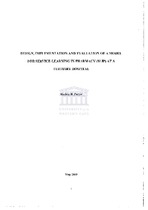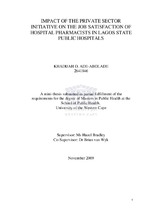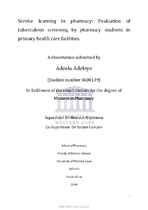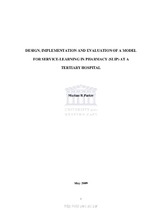| dc.contributor.advisor | Butler, Nadine | |
| dc.contributor.advisor | Bheekie, H. | |
| dc.contributor.author | Parker, Miriam Bibi | |
| dc.date.accessioned | 2015-10-20T15:42:26Z | |
| dc.date.available | 2015-10-20T15:42:26Z | |
| dc.date.issued | 2009 | |
| dc.identifier.uri | http://hdl.handle.net/11394/4603 | |
| dc.description | Magister Pharmaceuticae - MPharm | en_US |
| dc.description.abstract | In recent years the focus of pharmacy practice has changed from being primarily 'drug-centred to' one which is 'patient-centred' (El-Awady et al., 2006, p. l ). Developments in pharmacy curricula worldwide are reflecting this change. Pharmacy courses no longer concentrate primarily on theoretical content, but increasingly on the ability of students to apply their theoretical knowledge in practice. The South African Pharmacy Council (SAPC) requires that pharmacy education and training in South Africa equips pharmacists for the roles they will take on in practice. In order to accomplish this, the SAPC has prescribed competency unit standards for entry level pharmacists which may serve as a guide for pharmacy educators. A significant challenge in pharmacy education is the application of theory in practice settings (Bucciarelli et al., 2007), which possibly affects the ability of entry-level pharmacists to meet the SAPC unit standard competencies. The dire shortage of pharmacists in public sector health settings further emphasizes the need for a level of competency of entry level pharmacists so that they may enter the workplace ready to serve the medicine related needs of society. Service-learning is defined as experiential learning in which students engage in structured activities that address community needs and promote learning. The purpose of this study was to design, implement and evaluate a Service-learning in Pharmacy (SLIP) intervention which is intended to serve as a generic model which can be used in tertiary hospital pharmacies. The SLIP intervention aimed to promote student learning by providing opportunities for students to engage in structured activities, while simultaneously alleviating pharmacy workload. | en_US |
| dc.language.iso | en | en_US |
| dc.publisher | University of the Western Cape | en_US |
| dc.subject | South African Pharmacy Council (SAPC) | en_US |
| dc.subject | Pharmacy practice | en_US |
| dc.subject | Service-Learning In Pharmacy (SLIP) | en_US |
| dc.subject | Pharmacy education | en_US |
| dc.subject | Experiential learning | en_US |
| dc.title | Design, implementation and evaluation of a model for Service-learning in Pharmacy (SLIP) at a tertiary hospital | en_US |
| dc.type | Thesis | en_US |
| dc.rights.holder | University of the Western Cape | en_US |




